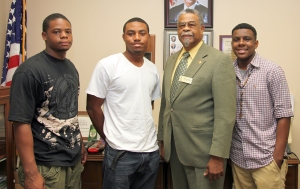
The three newest UAPB USDA/1890 National Scholars are
(left-right) Elijah Muhammad, agriculture major, Chicago;
Matthew Dismuke, plant science major, Camden, Ark.;
and Michael Jones, (extreme right), regulatory sciences/
environmental sciences major, Monticello, Ark.; with
George Richardson, USDA/1890 program liaison.
Carol Sanders | School of Agriculture, Fisheries and Human Sciences
PINE BLUFF, Ark. – As high school students weigh their options fully cognizant of potential student loan debt, they would be wise to consider being named a USDA/1890 National Scholar, says George Richardson, USDA 1890 program liaison. Scholars graduate debt free with a professional position available to them upon graduation.
Only a select few are accepted into the USDA/1890 National Scholars Program, a partnership between the U.S. Department of Agriculture (USDA) and the nineteen 1890 Historically Black Land-Grant Universities. Launched in 1992, the program awards scholarships to students attending 1890 Historically an Black Land-Grant Universities and pursuing a bachelor’s degree in agriculture, food, natural resource sciences or related academic disciplines.
When the program began, applicants had to be incoming freshmen, but now the program is open to entering sophomores or juniors exhibiting leadership and community service and junior college or second-year college students transferring to a four-year institution, says Richardson.
Scholars receive tuition, room and board, fees, books, use of a laptop and software while on scholarship. As long as normal progress is made toward a bachelor’s degree, the scholarship continues for up to four years. Another plus, says Richardson, is employment. Students have a job with employee benefits with USDA during the summers while in college and a professional position available through www.jobsusa.gov upon graduation.
National Scholars must major in agriculture or related sciences which include agronomy, agriculture business/management, agricultural engineering/mechanics, agricultural production and technology, agronomy or crop science, botany, food sciences, forestry and related sciences; home economics/nutrition; horticulture, natural resources management, soil conservation/soil science, farm and range management or other related disciplines such as pre-veterinary medicine or computer science.
Recipients are not selected by the 1890 institutions. Recipients apply to the 1890 institution of their choice and then submit a scholar’s program packet. Each 1890 institution can submit up to 10 packets of qualified candidates to the USDA Office of Advocacy and Outreach, which contacts the USDA agencies who make the final selections.
Students are not restricted to applying to only one institution; they can apply to multiple institutions, but each packet submitted must contain original signatures and transcripts or it will be disqualified.
Standards are high, and the competition is stiff, says Richardson, but the stakes are also high. For the past five years, fewer than 30 scholarships were awarded per year.
Twenty-one national scholars have graduated from UAPB, which has four national scholars on campus this year. Three are new — Michael Jones, a regulatory sciences/environmental sciences major from Monticello, Ark.; Elijah Muhammad, agriculture major from Chicago; Matthew Dismuke, a plant science major from Camden, Ark; and returning scholar Daniel Perry, an agricultural economics major from Marianna, Ark.
Application packets will soon be posted on the web at www.outreach.usda.gov. Then, click on the 1890 Historically Black Land-Grant Universities link. Richardson and some high school counselors will also have packets. For more information or help with the application process, contact Richardson at (870) 575-7241; (870) 541-0047 or richardsong@uapb.edu or George.richardson@osec.usda.gov.